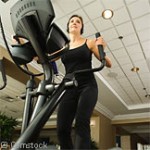Best Time To Hit The Gym
2013-03-12
We all know a few people who swear by working out at the crack of dawn every day.
They naturally enjoy waking up and heading straight to the gym, and claim to get more out of their exercise routines in the early-morning hours.
Then there’s another group that wouldn’t dream of getting on the treadmill, StairMaster or bike before 6 p.m., when the day is behind them and their muscles feel stretched and loose.
So which is better? Personal trainers and experts on exercise say the effectiveness of your gym time depends partly on your body rhythms as well as what exactly you’re trying to get out of it–whether it’s losing inches around your waist or putting inches on your biceps.
Primed In The P.M.
First, you have to pay attention to your body’s abilities, says Cedric Bryant, chief science officer for the American Council on Exercise, the nonprofit fitness certification and education provider. He counsels people that the best time to exercise is the one that works with their body clock and fits with their schedules.
But that said, from a physiological standpoint, Bryant says the afternoon may be a better time to engage in more explosive exercises, such as kickboxing or racquetball. Research has shown that the body’s temperature tends to rise by a few degrees in the afternoon, warming the muscles and connective tissues and resulting in a slight improvement in your performance capabilities.
Working out in the afternoon also requires a little less time stretching on the mat because your heart and muscles are more prepared for the stress of exercise than when you’re fresh out of bed, Bryant says. If you’re not putting in a longer warm-up, morning workouts can put you at a higher risk for injury.
Khari May, personal training manager at Crunch in New York, tells clients who want to build muscle mass to hit the weights in the afternoon. In the morning there isn’t enough glycogen in our muscles, or stored fuel, to support an effective workout.
“The body is like a well-put-together car,” May says. “If there’s not enough fuel it might not work for you or take you as far.”
A.M. Advantages
There are, of course, pluses to working out in the morning too. May recommends it for people whose main priority is losing weight. Working out, doing cardio especially, on an empty stomach will burn more fat calories because your carb reserves are almost used up. That causes the body to turn to fat stores for energy first. (Many fitness experts warn, however, that running on empty isn’t the most efficient way to work out.)
Another point in favor of the early birds is that evidence has shown they’re more likely to stick with their fitness routines.
“What happens is they’re able to get it in before the various demands of life compete for [their] time,” Bryant says. “Many of us are well-intentioned but then the realities of life come into play and squeeze out exercise.”
Spread It Out
No matter what time you end up choosing to work out, the experts say you’re probably better off spreading it out in frequent intervals throughout the week, rather than saving it all up for one hellish day or the weekend.
Even if you run the same number of miles in one day as you would have over three or four short sessions, you may burn the same amount of calories but you’ll lose out on other health benefits. Every time you exercise you temporarily lower your blood pressure and blood glucose levels, which provide cumulative benefits over the years, Bryant says.
What’s more, exercise can curb some people’s appetites, another good reason to spend more time at the gym than on the couch.
Perhaps the best reason? May says working out hard one day a week is a sure way to trash your body.
“Being a weekend warrior can’t make up for it,” he says. “You’re putting your body at risk and you’re not going to get the same effect.”


